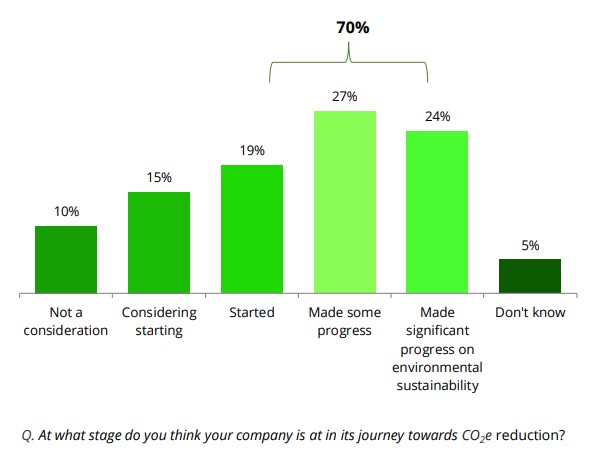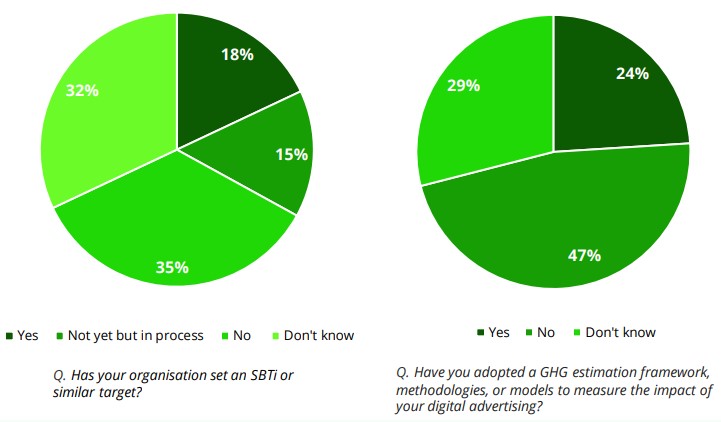Sustainability remains a focus for the industry, according to IAB Europe’s new report ‘State of Readiness – Sustainability in Digital Advertising’, with respondents to IAB Europe’s survey saying sustainability is one of their top three current business challenges. But sustainability drives within companies are still at quite early stages according to the report. Many are still concentrating mostly on reduction of greenhouse gases, but few say they’ve actually made significant progress.
IAB Europe’s survey, which covered agencies, ad tech companies, publishers, and other companies involved in digital advertising, found that 27 percent of respondents ranked sustainability as one of the two most important challenges facing the digital advertising industry. Only measurement and the deprecation of third-party cookies ranked higher, at 35 percent and 36 percent respectively. (It is worth noting, however, that ‘head of sustainability’ was one of the most common job titles of survey respondents, meaning they may place sustainability as a relatively high priority compared to their business as a whole).
Corporate responsibility, client expectations, and compliance with regulation are the three biggest factors driving interest in sustainability. Eighty-eight percent agreed or strongly agreed that CSR is a driving factor, while 81 percent cited client expectations, and 75 percent agreed that regulation is a significant factor. Large numbers also see the opportunity in sustainability a well – 66 percent say environmental sustainability is a vital component of their business model, and 55 percent see it as an opportunity for profit. Meanwhile 39 percent agreed or strongly agreed that it’s a threat to their business model.
For the time being, reducing greenhouse gas emissions remains the primary focus within sustainability. Sixty-four percent ranked GHG impact as one of the two most important aspects of sustainability, compared with 30 percent who picked social justice, 28 percent who chose creation of waste, and 28 percent who chose governance.
Stepping into action… gradually
But while sustainability appears to still be high up on businesses’ agendas, few say they’ve made significant progress on reducing greenhouse gas emissions. Only 24 percent say they’ve made significant progress, while 27 percent say they’ve made some progress, and 19 percent say they’ve started. The remaining are either considering starting, aren’t sure, or currently aren’t considering starting.
And a deeper dive into the kinds of actions companies have taken suggests sustainability initiatives are still in their early stages. Forty-eight percent of respondents say they’ve created a checklist (up from 46 percent last year), 51 percent have participated in industry forums, and 51 percent are either in the process of an environmental audit, or have already completed one. Only 12 percent say they are estimating the environmental impact of all campaigns they’re involved in (though 42 percent have run estimates for at least one campaign).
Overall, progress appears still to be being held back by a lack of standardisation and external verification.
Sixty-five percent of respondents said the industry needs external verification of standards and measurement of GHG emissions, up from 60 percent last year. Meanwhile the proportion who feel that standards are needed, but not yet, fell from 22 percent to 20 percent. This suggests the industry is shifting away from an early days mindset. It’s been said at times that too much focus on standardisation and verification in the early days might slow vital progress – the industry is increasingly minded that this phase is over.
Adoption of existing external standards, however, remains low. Only 18 percent have set up Science Based Targeting initiative (SBTi) targets, with 15 percent in the process of setting them up.
Eighty-nine percent agreed that a lack of industry standards is a key challenge the industry needs to overcome, while 77 percent said the same of a lack of transparency. Only lack of education (90 percent) ranked higher.
Despite these challenges, the results showed positivity too. Seventy-one percent of respondents agreed or strongly agreed that in the long run, the industry will achieve the transparency and information exchange required for robust estimation of GHG emissions in the digital advertising supply chain.






